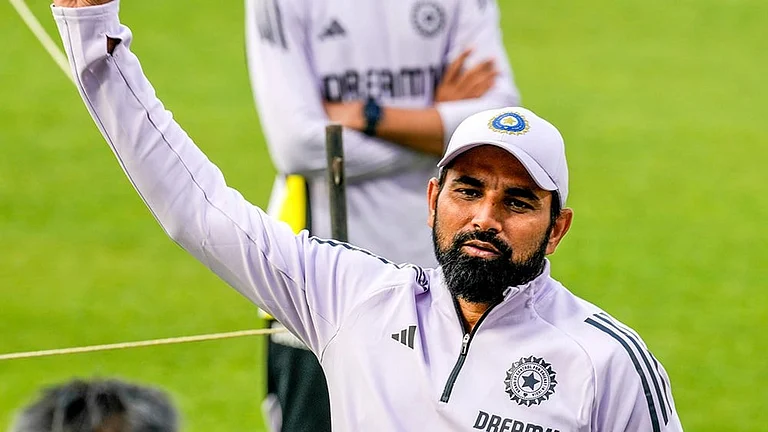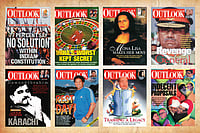THURSDAY, August 8. I'll always remember those birds. Our affable Border Security Force escort at the Attari border in Punjab, just 28 km from Lahore, puffs with justifiable pride as he shows off the ditch-cum-bandh, the formidable electric fencing with five alarm systems—"it runs the length of Punjab, you know"—the observation posts, the guards bristling with weapons, the heavy iron gates that open every Monday and Thursday to admit the Samjhauta Express from Pakistan into India. Four horse riders gallop alongside, armed BSF personnel stand all along the 1-km track to the station to ensure nobody gets off or throws contraband into the fields. "You'll see just now. It's a foolproof system. No one gets through without our permission," he concludes happily. As if in refutation three white egrets soar up and away over the ditch, the fence, the alarms, the posts, the guards, the gates, into Pakistani Wagah that lies just a green field away. So much for security. Inexplicably, I find myself elated.
Suddenly a whistle piercing the silence of the breeze. The train that's linked two estranged neighbours for 50 years is on its way. I clamber atop the observation post, smiling guard cocks his automatic, invites me to share his window. We brave wasps to peer out from the very opening they're coming in through. The train approaches, guards throw open the clanging iron gates, I glimpse a smiling engine driver. Images from Khushwant's Train to Pakistan, second memories of bitter-sweet Partition vignettes recounted by grannies on summer terrace nights resurface. In spite of myself I'm bristling with excitement. Find myself thinking "that driver doesn't look Muslim", immediately chide myself for the thought with a "and pray what do Muslims look like anyway?" reprimand. I clamber down and into the smiling driver Aijaz Rasool's train for my first Pakistani train ride. Into Indian Attari that lies 10 minutes away.
Inside the train, I smile. Some avert their gaze, some don't. A salwar kameez clad Pathan smiles back at me. "Ji adaab," I say summoning my best Lucknow lehja as I introduce myself. He greets me with a namaste. Turns out he's Bhagwandas—Urdu-speaking, Pathan-looking Sindhi, chappal manufacturer—resident of Pakistani Hyderabad visiting India to attend a family wedding at Jodhpur. So much for preconceived notions about what Hindus or Muslims 'look' like. I spot his bright-faced bindi-adorned Pakistani Hindu wife come on her maiden trip to India. She excitedly peers out of the window, clutches her lady companion's arm: "Dekh idhar dharti kinni hari hai (Look how green the earth is here)."In another corner of the compartment I engage a shy Lahoriya (Lahore resident), Aqueel Shahrukh, 20, in conversation. "First visit?" "Yes," he nods shyly. "Travelling alone?" I ask. "No," he says and points to his mother Razia, teenage sisters Atiqua Naaz and Farida. Razia is a friendly livewire, on her third visit to Delhi and Roorkee to see her cousins and find suitable boys for her daughters. "Shaadi to apnon mein hi karenge (will marry them into our own people)," she explains. And how does she like Hindustan, I ask. "Bahut mazzedar (very nice)," she shoots back. I'm about to move away but she hasn't finished. "Par hamara Pakistan bhi bahut achha hai. Come on August 14 and see hum Independence kitni khushee se manate hain (But our Pakistan is also wonderful. Come on August 14 and see how joyfully we celebrate Independence day). " Strike one for Pakistani chauvinism! I nod, promise to come to see and move to the compartment door. The shy Aqueel grabs my hand just as the train pulls into Attari. "Suniye Shah Rukh or Madhuri kya Dilli mein hi rehtey hain? Hum mil sakte hain unhe (Do Shah Rukh and Madhuri live in Delhi? Can we meet them)?" he questions eagerly. I offer to help an old lady offload her luggage. She clutches her bag, turns her back, shoots me a suspicious look. Not an Indo-Pak issue. Just natural caution in the presence of strangers, I tell myself philosophically as I withdraw hurriedly.
ATTARI is a station like any other barring the customs, immigration counters. Or the cleanliness. It's selective though: Platform 2 where passengers alight is hosed clean on train arrival days. Platform 1 and 3 are denied the privilege: those are for outbound traffic, so who gives a damn? The rest is similar. Vendors overcharge, sell Rs 32 Close Up toothpaste for Rs 40, Rs 62 Chyawanprash for Rs 70, the much-in-demand-with-Pakistanis Taj mahal tea packs for handsome premiums. Coolies charge extortionist rates: Rs 100 to shift bags from one adjacent platform to another. At the far end young Azeem Shaukat's good looking family stands in a huddle. The 23-year-old Lahore television and video parts shop owner is travelling back to Lahore with his new bride Najma, 22, a cousin from Malerkotla who he last met as a child and was pledged to wed. He waited one-and-a-half years to get a visa. His father, Shaukat, 57, laid siege at the Islamabad Embassy for seven months before he got visas. "I told them rishton par rail ki patri naheen chala saktey hain aap (you can't build tracks over relationships)." Shaukat's son-in-law, Zaheer Shah, 32, on a maiden trip to India sighs: " Kab samjheinge yeh log? Rishtey to aasmaan mein bante hain. Tabaahi zameen par hoti hai (when will they understand? Relations are made above, destroyed down below)." Problems didn't exactly cease once they touched base at Malerkotla. "The police extorted Rs 500 from us saying we should have reported our arrival at Sangrur, not Malerkotla. How were we to know unless they told us?" asks Zaheer.
Grievances aired, he settles down to praise his host country: films first, folks later. " Meri zindagi mein Pakeezah se behtareen film nahin dekhee (Never saw a better film than Pakeezah in my life)." He confesses to "repeating" Army and Muqabla in India, chats happily about how Hindi movies rent for Rs 25 per show, Amitabh's for Rs 35 for three hours. He confesses to prejudice: " Media mein Hindu Sikhs ke baare mein bura pada tha jaisa aap hamare liye padtey honge. Yahan sab bade pyar se miley. Hamein chhodney Hindu, Sikh padosi aaye (Read adverse media reports about Hindus and Sikhs as you do about us. Here they met us nicely, came to see us off)."
AZEEM'S granny is a winner. The still-beautiful gentle-voiced Begum Akbari Fateh Ali, 70, from Ludhiana is in India after 50 years. She loved the people. Also Nizamuddin's tomb, the Qutub dargah, particularly the Indira Gandhi samadhi at Delhi: " Bahut pursukoon jagah hai (Very peaceful place)." But Delhi is gandee (filthy), she complains. I ask her if she noticed a difference in the way women dress here. "They do wear ziyada tang (extra tight) salwar kameez here," she says pursing her mouth disapprovingly. So did she buy anything here? A wary, tart lady relative snubs me (I could be the customs man!). " Exchange paise dete ho jo karein? Hamein koi zaroorat nahin. Hamare Pakistan mein sab milta hai (Do you give us enough currency? We need not. We get everything in Pakistan)." The old begum holds my hand as if in compensation, insists I take her address, telephone number, visit her in Lahore. I promise to. And this once, I mean it.
The train is about to leave. Najma, the bride, sobs softly into brother Manzoor's arms. One by one Akbari clutches her large family to her bosom, the tears come rolling down. Feeling like an intruder I move on. Walk past the Persian-speaking Kulwant Kaur, 45, an Iran-based Sikh department store owner's wife travelling by the overland route to Zahedan via Lahore and Quetta. Her wailing mother from Delhi who she's met after nine years clings tightly to her daughter and grandson. Meanwhile, Anwar, the Karachi businessman I've befriended on the platform comes running to me, the journalist, complaining about a vendor overcharging him for toothpaste, asking me to intercede, which I do. Successfully. "
Hamare visa problem, in bad mashon ke liye aisa likhiyega ki sarkar sharminda ho jaye (Write about our visa problems, these swines, in a way that shames the government)," he beseeches me. He'd waited six months to get a visa to come to attend a family wedding. Another platform friend Mohammed Vakeel, 19, from Lahore yells out "Sunil bhai !" He wants me to meet his mother, Jameela Bi, who complains bitterly about the customs dacait (robbers) slapping a Rs 250 duty on paan she bought for just Rs 100 here. " Abhi Lahore wale gandasa le kar baithe honge. Is bare mein likhna Sunil bhai (And now Lahore customs will be waiting to slay us with sickles. Write about this, brother)." Brotherhood all the way. Another invitation to visit, another address exchanged. I feel I'm seeing off family by now.
The train pulls out of the station. Prashant and I ride in the train till the zero line. In the engine Aijaaz chats with fellow driver, curses the Indian station master, "that Malhotra bhain****", for swiping his cigarettes, then glances apologetically towards me. I get off at the border. Anwar and Vakeel hug me. Azeem and family wave out. So does Jameela Bi hanging out of her window. I stand in the rain watching the train recede into Wagah. Azeem keeps waving till the train goes out of sight. I stand in the rain, keep waving back. Those birds again. Egrets fly after them. I cannot. My cheeks are wet. It's not the rain.


























